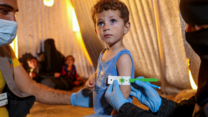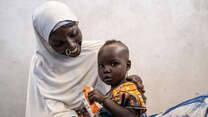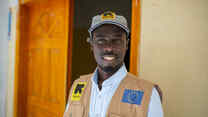WHO WE ARE
The mission of the International Rescue Committee (IRC) is to help people whose lives and livelihoods are shattered by conflict and disaster to survive, recover and gain control of their future. Our vision is that the IRC will lead the humanitarian field by implementing high- impact, cost-effective programs for people affected by crisis, and we will shape global policy and practice by sharing our learning and experience with others. All IRC programs are designed to achieve meaningful change in people’s health, safety, education, economic wellbeing and ability to influence the decisions that affect their lives.
The IRC is committed to ensuring that all children under five have access to quality life-saving care, regardless of where they live.
WHY OUR WORK MATTERS
Remarkable progress has been made in the last 25 years to reduce under-five mortality by 50%. Despite this, there remains a significant unmet need. According to the World Health Organization (WHO), in 2017 alone, nearly 15,000 children under five died each day totaling 5.5 million lives lost. These deaths were largely due to preventable and easily treatable conditions such as malaria, pneumonia and diarrhea, which account for more than 44% of under-five deaths. Furthermore, nearly 50 million children suffer from acute malnutrition which is linked to nearly half of all deaths of children under five. In many of the countries where the International Rescue Committee (IRC) works, under-five mortality remains high, particularly in Sub-Saharan Africa. Countries including Chad and Mali have under-five mortality rates that are three times higher than the global average. Inequities in under-five mortality between high-income and low-income countries remain large. The IRC's goal is to end preventable childhood deaths.
WHAT WE DO
The IRC is committed to ensuring that all children under five have access to quality life-saving care, regardless of where they live. We do this by supporting child health service delivery through health facilities, mobile health clinics – for those displaced by conflict – refugee camps, and through community health workers who deliver services to children living in remote and hard-to-reach areas. The IRC's child health programs span the arc of a crisis, from direct service delivery during acute emergencies to life-saving and preventative services across the nexus of humanitarian response and development. In line with the Global Bargain commitments to localization, the IRC's approach aims to challenge the traditional humanitarian paradigm that has prioritized rapid deployment by external actors over building local capacity and resilience.
IRC’s interventions to reduce child mortality include:
- Integrated community case management (iCCM) Since 2004, the IRC has pioneered iCCM among displaced populations in fragile, conflict-affected settings and development contexts in hard-to-reach regions. Through iCCM, community health workers (CHWs) are trained and supported to provide treatment for pneumonia, malaria and diarrhea, to children under-five in the community while also referring complicated cases to health facilities, and counseling care givers. In 2020, the IRC trained/supported nearly 17,000 CHWs, of which more than 5,500 went on to deliver more than 202,000 life-saving treatments for malaria, pneumonia and/or diarrhea in their communities.
- Integrated Management of Newborn and Childhood illnesses (IMNCI) IMNCI is an evidence-based strategy utilizing both preventive and curative elements to reduce death, illness and disability and to promote improved growth and development among children under five years of age. Through direct observation of consultations, the IRC has conducted quality of care assessments to measure the quality of IMNCI and iCCM services provided by health providers and CHWs respectively. Based on the assessment results, the IRC works with the providers to develop action plans and quality of care checklists. IRC is also committed to ensuring that all supported providers are trained on IMNCI, have access to IMNCI protocols and receive on-the-job coaching to ensure national protocols are adhered to. In 2020, the IRC supported 1,909,570 outpatient consultations for children under 5, a large majority of which were IMNCI consultations.
- Immunization: The IRC is committed to bringing life-saving immunization to children in the most challenging and hard-to reach areas. To address this, the IRC developed a mobile health platform (mReach) that enables health workers in communities and at health facilities to register all eligible children and track their immunization status. This app has been used in Uganda and Somalia to provide alerts for children who have missed an immunization appointment. In Ethiopia, the IRC developed a color-coded calendar to help caregivers plan their children’s follow up visits to health facilities.
- Improving aid through research uptake and advocacy for policy change: The IRC leads research to influence iCCM programming and policy at national and international levels. In the DRC, for example, the IRC conducted a randomized controlled trial to assess whether the WHO iCCM guidelines for a child with a simple fever (no danger signs and a negative assessment for malaria, pneumonia and diarrhea) should return to a CHW three days later for follow-up. The study revealed that the health outcomes remained the same regardless of whether the caregiver was told they had to return for a follow-up visit after three days or only had to return if symptoms persisted. The IRC published the results of this study and has advocated with WHO to modify the guidelines to lessen the burden of unnecessary follow-up visits for both caregivers and CHWs.


